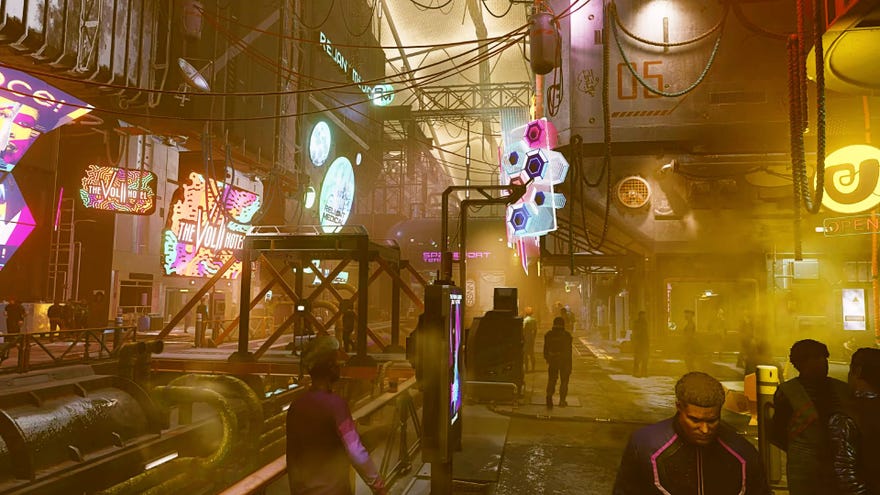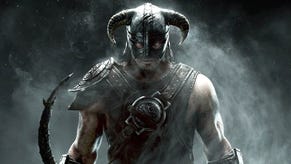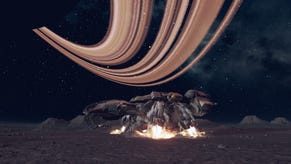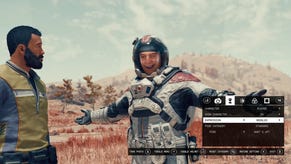Watch out Starfielders, there might be a shark in that elevator
Also, Bethesda feel their rep for bugs isn't "particularly fair"
A quick heads-up for those of you hopping aboard the Starfield interstellar express today: there is a non-zero possibility that one of the game's elevators has a shark in it. That's according to Bethesda's head of publishing Pete Hines, who encountered the displaced piscine trouble-maker while playing the game before release. He's "almost positive" the shark isn't there any more - and just like that, my understanding of Starfield has been transformed. This isn't a 150 hour RPG treadmill of resource extraction, artefact investigation and base-building, wherein you give spaceship tours and put +5% on your accuracy, or what-have-you. It's an extremely slowburn horror game, with every innocent elevator potentially housing a Great White jumpscare. All of which, Hines feels, is true to how Bethesda "embraces chaos" in their games, though he does feel the company's popular association with jank and bugs isn't "particularly fair".
Hines shared these thoughts in an interview with our sister site GamesIndustry.biz. OK, let's whittle down the fish-out-of-water probability a little. The elevator in question is on Neon, a cyberpunk planet (pictured above) consisting of a city built across an ocean. You might already know it as the birthplace of our Starfield review wrangler Alice B's custom character, who has yet to enter any elevators there, as far as I know. "We had a bug where a shark was able to get on an elevator," Hines reflected. "Then the elevator doors would open on a street level and the shark would come sliding out - everybody screams and starts running in every direction. I'm laying into it with weapons, people are screaming and guards are running. I said: 'Do not take this bug out of the game!' I'm almost positive they did but I love that stuff."
Bethesda's reputation for such goofy technical mishaps isn't undeserved, Hines acknowledged, but he does feel that "Bethesda gets lumped into this catch-all bucket that I don't think is particularly fair", pointing to the sturdy performance of Doom Eternal, Deathloop and Dishonored 2 as proof that the company can get it right. None of those games were developed by Elder Scrolls and Starfield developer Bethesda Game Studios itself, of course.
Hines added that there's an element of calculation to the often clownish technical wobbles of Bethesda open world sims. "Bethesda Game Studios has a reputation for things that happen in their games, yes. The thing people miss far too often is that there is some amount of that which is intentional, meaning we embrace chaos. We could make a safer, less buggy, less risky game if we wanted to. But what we try to lean into is player freedom. Yes, there's going to be some little things here and there where your companion might stand a little too close to you sometimes, yet the freedom you get, and the things that happen because of that, we absolutely love and embrace." You heard the man - when that gaping abyssal terror flops out of the elevator, give it a hug.
Elsewhere in the interview, Hines drew an interesting comparison with Arkane's Redfall, which released to very mixed verdicts and - with all due love and reverence to Arkane - ran like a sackful of spanners at launch.
"We are always in a process of learning, so that's not new for us," Hines reflected. "We don't like failing to meet our players' expectations. At the same time, we are the same company that has had launches that didn't go the way we wanted, and we don't quit or abandon stuff just because it didn't start right.
"The Elder Scrolls Online's PC launch was not flawless but we stuck with it," he went on. "Now it's like this insanely popular multiplatform. It's the same with Fallout 76. Redfall is no different for us. Okay, we didn't get the start we wanted, but it's still a fun game... and we're going to keep working on it. We're going to do 60fps. We're going to get it to be a good game because we know, as a first-party studio, Game Pass lives forever. There will be people ten years from now who are going to join Game Pass, and Redfall will be there.
"As for pressure on Starfield? There's always pressure with every launch. The pressure is an external thing we keep an eye on, but we don't allow it to be a focus because we have zero control over it. What can we control? We control the game. How good is it? How does it run? How fun is it? Well, then let's do that, and everything else will sort itself out."
I've often wondered why BGS don't commit to a proper early access model - as in a pre-1.0 period lasting months-to-years, rather than the six days Premium buyers have with Starfield before its official release date - for their mainstay open world singleplayer RPGs. I speculate that the company isn't really set up for that kind of approach, and possibly sees it as diminishing the impact of each release. But Hines sounds like he's hinting in that direction, in regards to how Bethesda's RPGs might evolve on Game Pass, which has become something of a safe haven for blockbuster 7/10s. It might defuse some of those "unfair" expectations of bugs, surely?








_RPpOtnt.png?width=291&height=164&fit=crop&quality=80&format=jpg&auto=webp)
